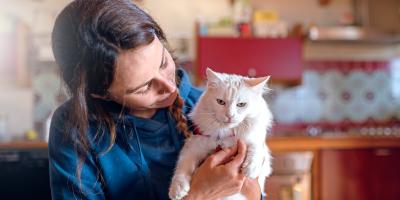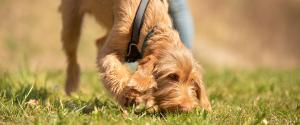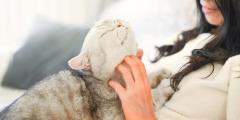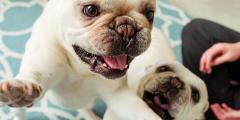
Have you ever wondered why do dogs eat poop? Read on to learn the reasons why and how to get a dog to stop eating poop.
While it might not be pleasant to admit that your dog eats their own feces, it's not an uncommon behaviour and may have some instinctual basis. Understanding the motivations behind this behaviour is the first step in addressing how to get a dog to stop eating poop. So why do dogs eat poop? Read on to find out.
Why Do Dogs Eat Poop?
The formal term for a dog eating feces is coprophagia, and it can be used for a dog that eats its own feces as well as if he is eating the feces of other animals. There are several theories as to why dogs engage in this behaviour, although none of them have been scientifically proven and the reasons behind coprophagia may be different for each dog. Here are a few of the most common theories for why dogs eat poop.
They Like the Taste
While this certainly seems like the least likely to us humans, dogs have an entirely different set of things they think are tasty — not many humans would be excited about raw chicken or dry kibble. It's possible that dogs who eat poop do it simply because they like it.
It's an Instinctual Behaviour
Another proposed theory for why dogs eat poop is that it's partly instinct leftover from their wild ancestors who were omnivorous scavengers. Before dogs got their daily mix of nutrients delivered straight to their doggie bowls, they had to scavenge for food, and some feces may have been sources of needed protein or fat.
Something Is Missing in Their Diet
One old theory behind coprophagia is that dogs eat feces when they are missing something in their normal diet. However, this has been mostly proven to be false. Even dogs who are getting well-rounded, vet-recommended diets may still eat feces. It is true that there are some medical disorders that may contribute to coprophagia, which is why it's a good idea to talk to a vet if this is an ongoing issue or you have any other concerns about your dog's health.
It's a Behaviour Issue
Some people believe that eating feces is a learned behaviour that dogs pick up from their mothers, who eat the puppies' feces to keep the nest clean and avoid attracting predators. It does seem to be more common in puppies, with many dogs growing out of it as they get older, but some dogs may also pick up the habit by watching other dogs or even do it out of boredom.
How to Get a Dog to Stop Eating Poop
While eating poop is generally not a big concern health-wise for your dog as long as your vet has ruled out any underlying health problems, it's certainly not pleasant to be around or live with. It can also be embarrassing if you take your dog to the dog park or use a daycare or boarding service. However, there are some things you can do if you're wondering how to get a dog to stop eating poop.
Adjust Their Diet
Anecdotal evidence suggests that putting chunks of fresh pineapple or a few pieces of diced raw zucchini in your dog's food may discourage him from eating his own poop. There's no scientific reason as to why this may work, but it could be that dogs don't like the taste of feces with these additions.
Address the Behaviour
If you believe that your dog's coprophagia is a behavioural problem, addressing the root cause can help get your dog to stop. Which method is most effective will depend on why your dog is eating poop, but a few to try include:
- Remove the opportunity. If there are no feces to eat, your dog won't be able to eat any. Supervise your dog when he's outside, and clean up after him as soon as he's done going to the bathroom.
- Provide a distraction. Dogs who eat poop because they are bored may stop the behaviour if you have other toys available or spend more time on walks or playing. Regular walks can also help curb other problem behaviours that might be due to excess energy and help your dog stay at a healthy weight.
- Spread out their meals. If your dog is eating feces because he's hungry, spreading out the same amount of food over more meals throughout the day can help him stay full.
- Use positive reinforcement. Whenever your dog ignores feces and doesn't try to eat, give them a special treat.
In extreme cases, you can also try using a basket muzzle when your dog is outside on walks so he can't physically eat the feces, but it's important to never use a muzzle when your dog is unattended for safety reasons. Keep in mind that it's also best to try one strategy at a time. This ensures you don't overwhelm your dog with changes, which can create additional issues, and ensures you're able to correctly identify which method finally works.
If none of the above work, it's worth taking your dog in for a checkup and discussing with your vet, who may have other behaviour suggestions or be able to provide recommendations on something you can add to your dog's diet to make feces taste bad. Your vet may also be able to refer you to a dog behaviourist who can work with you one-on-one to come up with a plan to address eating feces that's tailored to your dog's personality and needs.
Being a dog owner is a rewarding experience, but it's not without its challenges. If you've ever wondered what your dog is trying to tell you or wanted to learn more about how to best care for your pet, Purina Canada has a variety of resources and tips on dog health and behaviour.
Related articles



